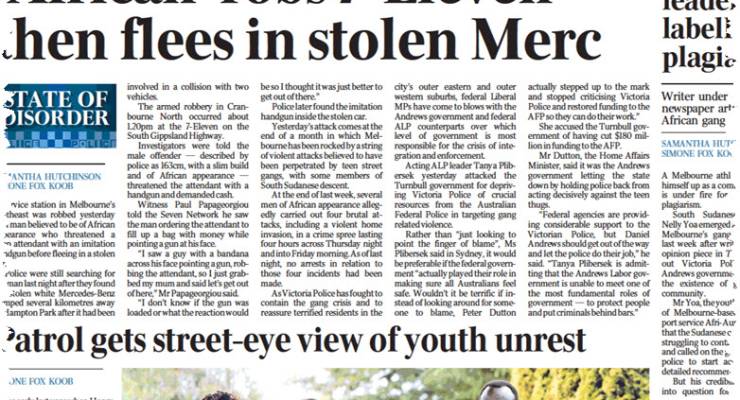
This summer, the “African gang” has shifted race and racism in Australia, and the media have been helping turn the screw. Australian politics has blown through the restraints of dog whistling, such as they are, into the overt racism of full-bore Trumpism.
The virtue of dog-whistling was that supposedly only the dogs could hear you; the whistler can straight-faced deny that race is involved. Looking back, it’s almost quaintly respectable.
It was thought shocking when the Australian media called it out in the 2001 Tampa election, only a decade after The Australian had declared Andrew Peacock unfit to be PM, accusing him of anti-Asian dog-whistling.
We’ve become so used to the whistle that we’re failing to notice that it’s gone. Now, with our “African gang” moment, we’ve caught up with the United States.
Trump launched his US presidential campaign in 2016 with a fracturing of previous US political proprieties by overtly linking immigration and crime. He said of Mexican migrants: “They’re bringing drugs. They’re bringing crime. They’re rapists. And some, I assume, are good people.”
Eighteen months later, we’ve landed in the same place.
In his New Year comments, Turnbull tried to keep to the form of dog-whistling, talking about crime and gangs without racial identifiers. Crime has long been a dog whistle of choice.
No such subtlety from the minister for the bespoke portfolio of Home Affairs, Peter Dutton. The Queenslander, speaking on Sydney radio, said of Melbourne: “We just need to call it for what it is. Of course it’s African gang violence.”
And with Dutton’s intervention, the old dog that Turnbull was still attempting to whistle up, was effectively euthanised. Reporting of Turnbull’s comments were bannered with “African gang”. Any restraint was lost. Now we have MPs calling for deportation of gang members and their families and social media ablaze with the ugliest of racism, calling for everything from mandatory detention to summary execution.
The “African gang” scare emerged from the Herald Sun’s law and order campaign as the practices of the post-Brexit British red-tops and the post-Trump right-wing US media seeped into Australian tabloids — even into the Herald Sun, which has attempted to position itself as a better class of tabloid.
The Australian has gone in full bore in support of the campaign, marking the increasing journalistic alignment of News Corp’s national broadsheet with its metropolitan tabloids.
Individual journalists have pushed back. The ABC’s Barrie Cassidy tweeted that the Herald Sun’s January 3 front page was “close to the worst piece of journalism I have witnessed”.
However, the ABC and Fairfax have not been much better, generally accepting the “African gang” meme as a given, handling the extreme statements from the government and backbench MPs with a cautious “he said, she said” approach. Coverage demonstrated that job losses (and the media’s generic whiteness) too often left newsrooms without contacts on the ground to provide proper nuance.
Such push-back as there was came in an almost Jesuitical parsing of what “African” means in this context and what a “gang” actually is, as if that mattered to the government’s audience.
Crimes, no matter how minor, are highlighted where the police are looking for people of “African appearance”, in apparent contradiction of the MEAA Code of Ethics, which bans “unnecessary emphasis on … race, ethnicity, nationality”. (A similar clause in the guidelines of the Australian Press Council was removed in a 2014 redraft.)
The “African gang” meme marks a further turn in what journalist George Megalogenis has called Australia’s “revolving door of xenophobia”. East African migrants have been fitted for this role before, going back to 2007 comments by then-immigration minister Kevin Andrews.
Post-Brexit, post-Trump, we shouldn’t be surprised that politicians seek political advantage by discarding the dog whistle for, let’s call it, the Trump-et. Nor that their political colleagues are loath to call them out. They want to be elected, after all.
But as US writer Ta-Nehisi Coates says: “Journalists have no such excuse.”








It’s easy to see why they Botha.
KLEWSO: Eeeek. It’s too early in the New Year for that pun. Isn’t?
Also, no. It’s going to grow grim & gritty this year.
Turnbull is a disgrace. With Dutton it’s to be expected.
Turnbull also equated opposition to mandatory sentencing with support for pedophilia. The man has always been a nasty bully with a penchant for smears when the chips are down, despite the media whitewashing of him as a smooth charmer, but his recent form has been particularly disgraceful even for him.
It’s been appalling watching senior politicians who don’t live anywhere near Melbourne jump so eagerly on this bandwagon. It is possible to address a crime issue without damaging social cohesion, but these pricks don’t give a damn.
Not so much a dogwhistle as a brass band marching down Main Street.
Dutton is a putrid carbuncle on the arse of Australian society.
Putrid carbuncles don’t deserve that!